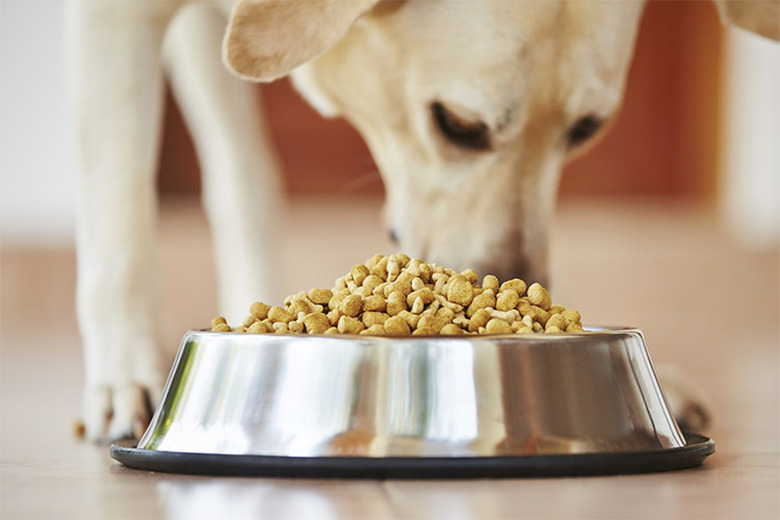Can Diet Affect A Dog's Attitude And Behavior?
When looking at a dog's attitude or behavior, the first step is to examine what he eats. Cheaper foods tend to have more filler grain products, which are the primary culprits for allergies. If your dog is irritable because of allergies, it will certainly affect his attitude. Attitudes like aggression and hyperactivity have been associated to dog food quality and ingredients. The better quality food he is eating, the better his physical and mental health will be.
Dogs with dominance aggression show improvement with low-protein foods.
Dogs with dominance aggression show improvement with low-protein foods.
Studies on the impact of nutrition on canine aggression focus primarily on fear aggression and dominance aggression. Dogs with fear aggression have shown vast improvement with low protein food. More important than the amount of protein in your dog's food is the amount of tryptophan he gets. Tryptophan is an essential amino acid found in protein and is necessary for the production of serotonin, which stabilizes your dog's mood. Dogs with dominance aggression show improvement with either low protein food or tryptophan supplementation to their high protein food, although tryptophan supplements help dogs with fear aggression as well. The Animal Medical Center of Southern California hypothesizes that dog foods too high in protein are producing an over-abundance of amino acids. The amino acids are choking out the tryptophan the same way weeds choke out grass.
Some types of dog-food ingredients can cause hyper activity.
Some types of dog-food ingredients can cause hyper activity.
As a professional trainer, Jeanne Perciaccanto discusses nutrition with her clients when they are presenting dogs with hyperactivity issues. She has noticed that hyper dogs are frequently feed foods that contain a disproportionate amount of cereal grains like wheat, corn or corn meal compared to animal-based protein. Carbohydrates like grains and starches create spikes in dogs' blood sugar levels. A dog food containing more than 35 percent carbohydrates will interfere with the amount of amino acids the dog is eating and inhibit his brain function which triggers the out-of-control hyperactivity. Since he is eating a lower ratio or protein to grain, tryptophan levels are also lowered and therefore less serotonin is produced to calm your dog down.
These dog-food ingredients may be problematic.
These dog-food ingredients may be problematic.
The Animal Medical Center expresses concerns that other additives in dog food are affecting canine behavior, specifically aggression – but there isn't enough scientific research conducted to conclusively support this. Their concern is based contact with dogs in their clinic. According to Animal Medical Center, ingredients that are problematic are foods using soy as a protein. Since it is a plant-based protein and not animal based, it is lacking in some of the amino acids necessary for serotonin production. Additionally soy contains plant estrogen, which is believed to cause hormonal imbalances in dogs thus triggering aggression and hyperactivity. Other ingredients that are suspected to create behavioral issues are artificial preservatives and food coloring.
How to read nutrition labels on dog food.
How to read nutrition labels on dog food.
If you're trying to adjust your dog's attitude, there are some specific items to be on the lookout for when reading a dog food nutrition label. The first three-to-five ingredients listed are the most important as that is what the bulk of the kibble is made from. You will also be able to determine the amounts and types of proteins, grains, fat and what preservatives are used. Use this information, along with your veterinarian's advice to determine the best food to change your dog's behavior and offer him optimal health.

